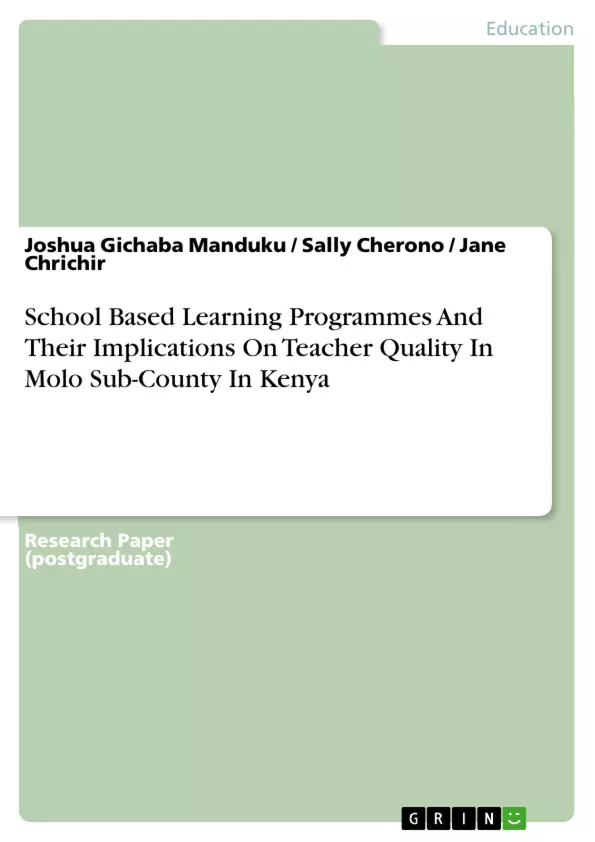The purpose of this study was to assess the effect of School Based Learning Programmes on teachers’ effectiveness in Molo Subcounty. School Based Learning Programme is a mode of study undertaken by teachers who are already in the teaching profession. This programme is offered during the school holidays in April, August and December and in the evenings and weekends. The programme affects the teachers’ performance in their respective secondary schools either positively or negatively.
This study was guided by five main objectives: To determine the effect of School Based Learning Programme on teacher’s effectiveness on planning for instruction, on lesson content delivery, teacher’s evaluation skills, on development of Student-Teacher relationship and finally to examine the effect on their use of teaching- learning resources on their teaching. The study employed descriptive survey design. 356 teachers, 36 head teachers, one Quality Assurance and Standards Officer which formed a target population of 393 respondents.
Inhaltsverzeichnis (Table of Contents)
- Background of the Study
- Statement of the Problem
- Purpose of the Study
- Objectives of the Study
- Research Questions
- Research Hypothesis
- Significance of the Study
- Theoretical framework
- Conceptual framework
- Education Level of the Respondents
- Effects of SBLP on Teachers' Planning For Instruction
- Effects of SBLP on Teachers' Lesson Content Delivery
- Summary of the results findings
- Effects of SBLP on teachers' planning for instruction
- Effects of SBLP on teachers' lesson content delivery
- Conclusions
- Recommendations
Zielsetzung und Themenschwerpunkte (Objectives and Key Themes)
This study aims to evaluate the impact of School Based Learning Programmes (SBLP) on teacher effectiveness in secondary schools within Molo Sub-County, Kenya. The study focuses on understanding how SBLP influences various aspects of teaching practice, including planning for instruction, lesson delivery, student evaluation, teacher-student relationships, and the utilization of teaching-learning resources.
- The impact of SBLP on teacher effectiveness in secondary schools.
- The relationship between SBLP and teacher planning, lesson delivery, and student evaluation skills.
- The influence of SBLP on the development of teacher-student relationships.
- The role of SBLP in enhancing the use of teaching-learning resources.
- The effectiveness of SBLP in improving the overall quality of education in Molo Sub-County.
Zusammenfassung der Kapitel (Chapter Summaries)
The study begins with a detailed background on the significance of teacher education and professional development programs, highlighting the importance of SBLP in supporting and maintaining teacher quality. The research problem focuses on the lack of understanding regarding the impact of SBLP on teacher effectiveness in Molo Sub-County. The study aims to bridge this knowledge gap by examining the effects of SBLP on various aspects of teaching practice.
The study then delves into the theoretical and conceptual frameworks that underpin the research, exploring the relationship between SBLP and effective teaching practices. It further explores the educational levels of the respondents and examines the effects of SBLP on teachers' planning for instruction and lesson content delivery. The chapter concludes with a summary of the results findings, emphasizing the significant positive relationship between SBLP and various aspects of teacher effectiveness.
Schlüsselwörter (Keywords)
The study focuses on the impact of School Based Learning Programmes (SBLP) on teacher effectiveness in secondary schools, exploring the relationships between SBLP and teacher planning, lesson delivery, student evaluation, teacher-student relationships, and the use of teaching-learning resources. The research utilizes a descriptive survey design and examines the potential benefits of SBLP in improving the overall quality of education in Molo Sub-County, Kenya.
- Quote paper
- Dr. Joshua Gichaba Manduku (Author), Sally Cherono (Author), Jane Chrichir (Author), 2017, School Based Learning Programmes And Their Implications On Teacher Quality In Molo Sub-County In Kenya, Munich, GRIN Verlag, https://www.grin.com/document/366608



